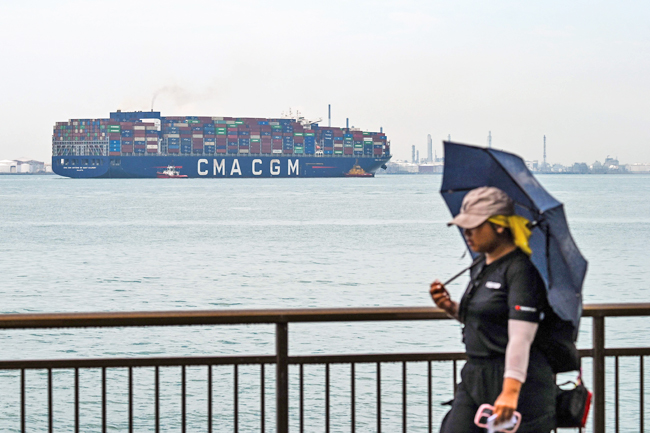ANN/THE STRAITS TIMES – Several economists have revised down their projections for Singapore’s key exports in 2025, as global trade faces mounting uncertainty following fresh tariffs announced by United States (US) President Donald Trump.
Enterprise Singapore, the nation’s trade agency, said it is “actively monitoring the evolving tariff situation and will adjust the non-oil domestic exports (Nodx) forecast for 2025 as necessary to reflect the changing market conditions”. The agency released its latest Nodx figures for March on Thursday.
In February, Enterprise Singapore projected that Nodx would grow by one to three per cent in 2025, following a modest 0.2-per-cent increase in 2024. However, signs of weakness emerged in the March data, which captured early impacts of trade disruptions ahead of President Trump’s April 2 announcement of sweeping global tariffs – measures that have since intensified tensions with China and rattled global markets.
Singapore’s Nodx rose 5.4 per cent year-on-year in March, falling short of the 7.5-per-cent gain recorded in February and significantly underperforming economists’ expectations of 14.1 per cent growth, based on a Reuters poll.
Analysts said the worsening trade environment could weigh heavily on Singapore’s open economy, particularly in electronics and precision engineering – two sectors sensitive to global demand and trade flows.
Electronic exports expanded 11.9 per cent year-on-year – though this was from a low base a year ago. Growth was underpinned by personal computers, disk media products and integrated circuits. Non-electronics exports grew 3.8 per cent – half the pace of February’s revised 7.7 per cent increase.
Non-monetary gold led the charge with a 64.7-per-cent expansion, while pharmaceuticals rose by 24.9 per cent.
Nodx to Indonesia and South Korea grew, though shipments to China – Singapore’s single largest export market – declined.
The main drag on Nodx was China, which saw a 29.4-per-cent drop in shipments versus a 27.4-per-cent plunge in January.
Maybank Research senior economist Chua Hak Bin said the decline in exports to China suggests that US tariffs are disrupting Chinese demand and manufacturing supply chains.
“Looking ahead, export growth is losing momentum and may contract in the coming months,” he said.
Shipments to the US grew 5.7 per cent in March, a sharp drop from the 21.5-per-cent growth in February.
Shipments to Indonesia expanded by 63 per cent in March, after the 5.4-per-cent decline in the month earlier. Growth was underpinned by structures of ships and boats, personal computers and non-monetary gold.
Nodx to South Korea rose by 21.6 per cent in March, after the 31.4-per-cent growth in the preceding month owing to specialised machinery, measuring instruments and integrated circuits.
Compared with a year earlier, total trade rose 3.4 per cent in March, following a 4.6-per-cent expansion in February. DBS Bank senior economist Chua Han Teng said any downward revision of Enterprise SG’s export forecasts should align with the weaker 2025 gross domestic product (GDP) growth outlook.
The World Trade Organisation (WTO) now expects world merchandise trade volume to contract by 0.2 per cent instead of expanding by 2.7 per cent in its January forecast.
Chua noted that the WTO has already slashed its 2025 forecast for the volume of global trade in goods due to the sweeping tariffs, ensuing retaliation and uncertainty.
The WTO now expects world merchandise trade volume to contract by 0.2 per cent instead of expanding by 2.7 per cent as in its January forecast.



